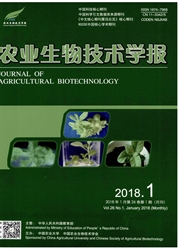

 中文摘要:
中文摘要:
在筛选胸膜肺炎放线杆菌(Actinobacillus pleuropneumoniae,APP)转座突变体库时,发现hns基因缺失突变可显著增强APP血清1型生物被膜的形成,该基因编码一种DNA结合蛋白(组蛋白样类核结构蛋白,H-NS)。为了进一步研究H-NS对APP生物被膜形成的影响,实验以APP血清1型4074株基因组DNA为模板,PCR扩增了408bp的hns基因编码区,并克隆到原核表达载体pET-28c中获得重组质粒pET28c-hns,转化大肠杆菌(Escherichia coli)BL21(DE3),经IPTG诱导表达和组氨酸亲和层析柱纯化获得大小约19kD的重组蛋白rH-NS。将不同浓度的rH-NS添加到hns突变株1-21及其亲本菌株4074的培养基中,用微孔板法测定生物被膜的形成。结果显示,在不添加rH-NS时,4074株不能形成可见的生物被膜,而1-21株形成明显的生物被膜;在添加0.1~0.3μmol/LrH-NS的情况下,1-21株生物被膜的形成量随着rH-NS浓度的升高而降低,而4074株随着rH-NS浓度的升高而升高;rH-NS添加量超过0.4μmol/L对两个菌株生物被膜形成未见明显影响。结果表明H-NS蛋白负调控APP生物被膜的形成,并呈现一定的剂量效应。
 英文摘要:
英文摘要:
The previous STM (signature-tagged mutagenesis) studies found that the disruption of the/ms gene encoding a histone-like nucleoid structuring protein (H-NS) could enhance biofilm formation of Actinobacillus pleuropneumoniae (APP). To further investigate the effect of H-NS on APP biofilm formation, the 408 bp complete coding sequence of fins gene was amplified by PCR from the genomic DNA of APP serotype 1 strain 4074 and cloned into the prokaryotic expression vector pET-28c. The resultant recombinant plasmid pET28c-hns was transformed into Escherichia coli BL21 (DE3). And a 19 kD of recombinant protein (rH-NS) was obtained by IPTG induction, and purified using the Ni-NTA agarose columns. Different concentrations of rH-NS were added into the culture medium of the hns transposal mutant strain 1-21 and its parental strain 4074, and biofilms were quantified using the microtiter plate biofilm assay. Without rH-NS in the medium, strain 1-21 formed obvious biofilms, but strain 4074 did not. Supplemented with 0.1--0.3 μmol/L rH-NS in the culture medium, the biomass of biofilms formed by strain 1-21 continuously decreased, whereas that formed by strain 4074 was increased. No obvious changes could be observed when more than 0.4 μmol/L ofrH-NS was supplemented in both strains. Results indicated that H-NS negatively regulates biofilm formation ofA. pleuropnelunoniae in a dose-dependent manner.
 同期刊论文项目
同期刊论文项目
 同项目期刊论文
同项目期刊论文
 Potential use an Actinobacillus pleuropneumoniae double mutant strain DeltaapxIICDeltaapxIVA as live
Potential use an Actinobacillus pleuropneumoniae double mutant strain DeltaapxIICDeltaapxIVA as live Construction and immunogencity of a DeltaapxIC/DeltaapxIIC double mutant of Actinobacillus pleuropne
Construction and immunogencity of a DeltaapxIC/DeltaapxIIC double mutant of Actinobacillus pleuropne Evaluation of immunogenicity and protective efficacy of Actinobacillus pleuropneumoniae HB04C(-) mut
Evaluation of immunogenicity and protective efficacy of Actinobacillus pleuropneumoniae HB04C(-) mut Immunoproteomic analysis of outer membrane proteins and extracellular proteins of Actinobacillus ple
Immunoproteomic analysis of outer membrane proteins and extracellular proteins of Actinobacillus ple In vivo induced RTX toxin ApxIVA is essential for the full virulence of Actinobacillus pleuropneumon
In vivo induced RTX toxin ApxIVA is essential for the full virulence of Actinobacillus pleuropneumon Generation of monoclonal antibodies and epitope mapping of ApxIVA of Actinobacillus pleuropneumoniae
Generation of monoclonal antibodies and epitope mapping of ApxIVA of Actinobacillus pleuropneumoniae Study on immunogenicity of the N-terminal polypeptide of RTX toxin I of Actinobacillus pleuropneumon
Study on immunogenicity of the N-terminal polypeptide of RTX toxin I of Actinobacillus pleuropneumon Characterization of ISApl1, an insertion element identified from Actinobacillus pleuropneumoniae fie
Characterization of ISApl1, an insertion element identified from Actinobacillus pleuropneumoniae fie Multiplex PCR That Can Distinguish between Immunologically Cross- Reactive Serovar 3, 6, and 8 Actin
Multiplex PCR That Can Distinguish between Immunologically Cross- Reactive Serovar 3, 6, and 8 Actin Loop-mediated isothermal amplification targeting the apxIVA gene for detection of Actinobacillus ple
Loop-mediated isothermal amplification targeting the apxIVA gene for detection of Actinobacillus ple Cloning, expression and immunogenic characterization of the apxIIA gene of Actinobacillus pleuropneu
Cloning, expression and immunogenic characterization of the apxIIA gene of Actinobacillus pleuropneu Histone-like protein H-NS regulates biofilm formation and virulence of Actinobacillus pleuropneumoni
Histone-like protein H-NS regulates biofilm formation and virulence of Actinobacillus pleuropneumoni 期刊信息
期刊信息
